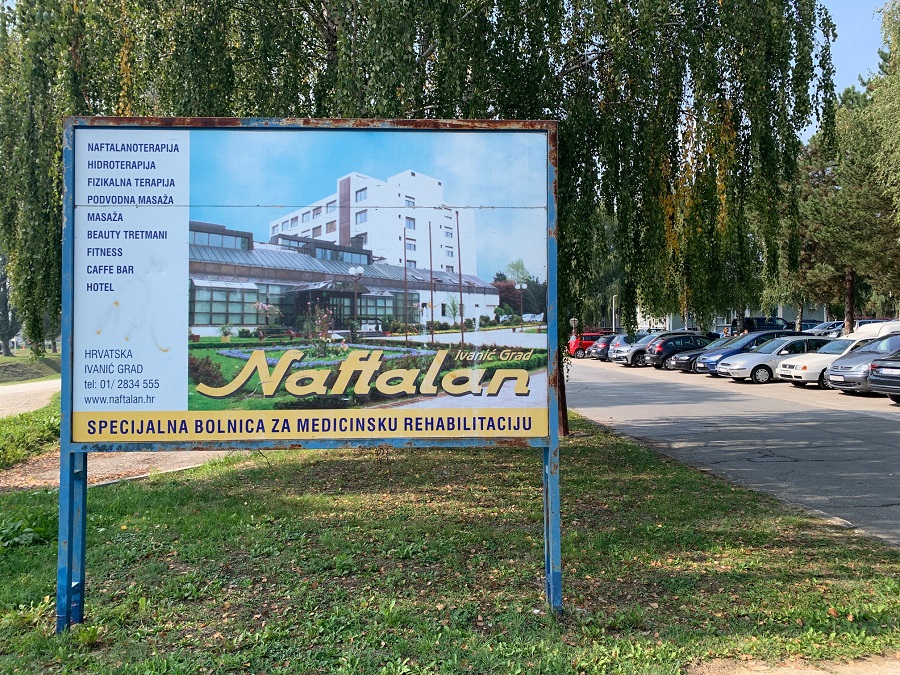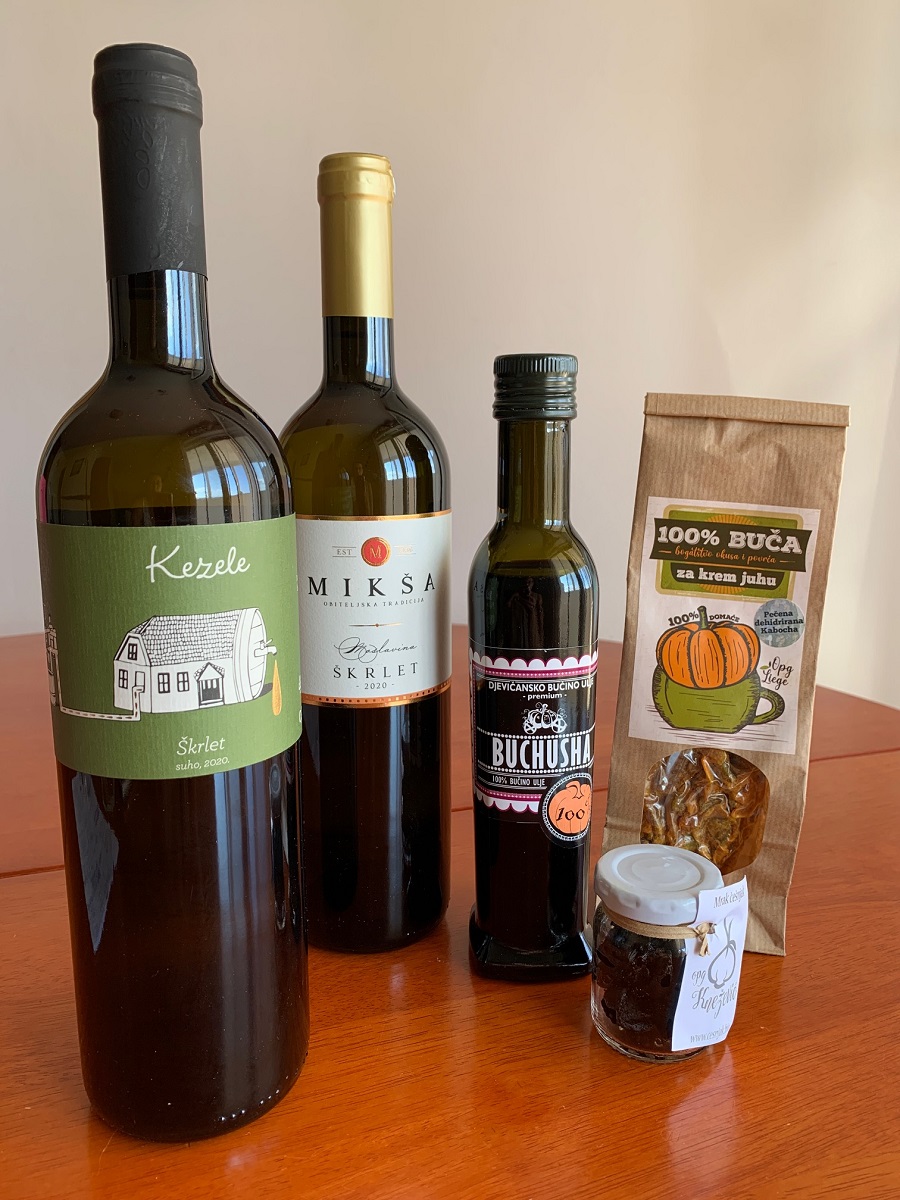Jesuits Say Didn't Authorise Priest to Attend Protest Outside Hospital
ZAGREB, 4 Oct 2021 - The Croatian province of the Society of Jesus said on Monday it did not authorize father Zdravko Knežević to participate in this morning's protest outside a Zagreb hospital against mandatory COVID certificates for health workers.
Knežević was among some 50 protesters who booed Health Minister Vili Beroš upon his arrival there to mark the start of the certificate mandate in the health sector. The media reported that Knežević shouted "treason, the gallows, you are Judases" to Beroš.
In a press release, the Croatian province of the Society of Jesus distanced itself from Knežević's participation in the protest, even though he said he was there as a private person.
The province also distanced itself from his statements at the protest, saying that some of them, as carried by the media, were totally inappropriate. "Because of that, I apologize to everyone who was hurt by them," father Dalibor Renić said in the press release.
"I believe health workers and their leadership deserve our trust and support in their attempts to give citizens the best healthcare in this pandemic crisis," he added.
For more on politics, follow TCN's dedicated page.
20 of 6,236 Health Workers Tested Positive, Says Minister
ZAGREB, 4 Oct 2021 - Health Minister Vili Beroš said on Monday 6,236 health workers in some 60 medical institutions were tested today, when COVID certificate mandate was introduced in the health sector, and that 20 of the tests came back positive.
"That's another irrefutable argument that the measures are necessary for protecting patients and workers," he tweeted.
Not one test came back negative and four staff did not show up for testing at KBC Zagreb, Croatia's biggest hospital, where a protest was held this morning against mandatory certificates and testing.
As of today, every employee in the health and social care sectors, as well as visitors, must have a COVID certificate. Medical workers without it must be tested twice a week.
The chambers of physicians and nurses supported the mandatory certificates, saying they will contribute to patient's safety, while condemning the protests held outside some hospitals, saying they disrupted the peace patients need for their treatment.
For all you need to know about coronavirus specific to Croatia, make sure to bookmark our dedicated section and select your preferred language.
Minister: We Want Rijeka to Become the Strongest Port in This Part of the Adriatic
RIJEKA, 4 Oct 2021 - Transport Minister Oleg Butković said on Monday that Rijeka would be one of the cities that could boast the good road and rail infrastructure and that efforts were being invested in making Rijeka the strongest port in this part of the Adriatic.
After meeting with Rijeka Mayor Marko Filipović, Minister Butković said that the meeting was constructive and that large-scale projects in Rijeka and in the Primorje-Gorski Kotar County were progressing well.
He announced a tender for a double-track railway line running through Rijeka, a €330 million project, which would be advertised in 2022.
"That project will complete the D 404 road, which connects the eastern part of Rijeka port with the city ring road and D 403. It then connects the Zagrebačka Obala container terminal with the ring road and future road from the Zagrebačka Obala terminal to Žabice. It will close the ring road around Rijeka as far as road infrastructure is concerned and Rijeka will be one of the few cities to have resolved its road and rail infrastructure, that is, all of its problems," he underscored.
The officials discussed the construction of the new bus station in Rijeka and Butković said that the funds for that purpose had been ensured.
The minister and the mayor also discussed the construction of several road junctions, roundabouts, and how preparations and financing for the projects were going on.
Butković informed that currently about HRK 25 billion was being invested in transport infrastructure throughout Croatia.
For more on politics, follow TCN's dedicated page.
Chambers of Physicians, Nurses Criticise Protests Against COVID Certificates, Testing
ZAGREB, 4 Oct 2021 - The Croatian Chamber of Physicians said on Monday it supported mandatory COVID certificates in the health sector as a measure that would contribute to patients' safety, adding that protests against them in or near hospitals disrupted the peace patients need for their treatment.
The chamber said patients' health and safety should come first to all health workers, adding that 95% of physicians had either been vaccinated against coronavirus or recovered from COVID.
The chamber said it was confident the few doctors and a minority of other health workers who had not would be tested every week, adding that regular testing was part of the measures introduced in line with the law protecting the population from infectious diseases and rules preventing hospital infections.
There is no acceptable justification to refuse testing because that directly harms the safety of patients, the chamber said.
Chamber of Nurses distances itself from protesting members
The Croatian Chamber of Nurses too said it supported the decision on mandatory COVID certificates in the health sector, distancing itself from a dozen of its members who protested outside several hospitals this morning against mandatory certificates and testing.
Several dozen nurses are protesting outside hospitals against measures preventing COVID-19 instead of honoring medical rules, getting tested, and working with patients, the chamber said, adding that 72% of nurses have been vaccinated, plus those that have recovered from COVID.
The chamber said it was unacceptable of individuals outside the health sector to attempt to use the situation and manipulate workers in the sector, and once again called on the nurses who have not been vaccinated yet to do so as soon as possible.
About 50 protesters booed Health Minister Vili Beroš outside the KBC Zagreb hospital this morning.
Outside the KBC Split hospital, a group of disgruntled citizens and several hospital staff insulted the hospital director and grabbed some physicians by the arm.
For more on politics, follow TCN's dedicated page.
HND Says HRK 6.2m Claim for Damages Against News Portal Scandalous
ZAGREB, 4 Oct 2021 - The Croatian Journalists Association (HND) on Monday described as scandalous businessman Josip Stojanović Jolly's lawsuit against the news portals Telegram.hr, Šibenik In, Šibenik News, and Šibenski Portal, in which he seeks HRK 6.2 million in damages from them for causing damage to his reputation.
"This is an unprecedented financial attack on the media in Croatia and it seems to be an introduction into a new series of lawsuits against media outlets, aimed at intimidating and destroying them," HND president Hrvoje Zovko told a news conference.
He noted that the claim for damages ensued after an article that was based on a non-final court verdict against the businessman, published by Telegram.hr and carried by the Šibenik-based news portals. Stojanović sued Telegram.hr, seeking HRK 2.3 million in damages, and the three news portals from Šibenik, seeking another 3.9 million in damages.
HND calls on Stojanović to drop his "crazy and scandalous claim"
Zovko said that the HND had notified the European Federation of Journalists (EFJ) about the case, calling on Stojanović to drop "this crazy and scandalous claim."
He said that the case was a kind of introduction into a debate about strategic lawsuits against public participation (SLAPP) against reporters and media, to be held at an EFJ conference to take place in Zagreb at the end of the week.
Minister should react
Zovko recalled that the Ministry of Culture and Media recently set up a task force to provide expert advice in shaping a policy against SLAPP suits and that the last case was a sort of test of the competent institutions' determination to combat SLAPP suits.
He called on Minister Nina Obuljen Koržinek to comment on the latest case, stressing that claims for damages against media outlets and reporters had become a competition to see who would sue reporters more and who would seek higher damages, with the initial amounts being ten, twenty, thirty and a hundred thousand kuna and the latest case amounting to more than six million.
Telegram.hr editor Jelena Valentić said that the article in question, in which the non-final ruling against Stojanović was carried and which was made in line with professional rules, was followed by the businessman's lawsuit in which he sued the portal for causing damage to his reputation and for loss of profit, estimated at some two million kuna.
Valentić said that this was just one in a number of claims for damages against Telegram.hr, noting that it put huge pressure on journalists.
"This is intimidation, aimed at preventing us from doing our job," she said, an assessment supported by Šibenski Portal editor Ksenija Bilan, who recalled numerous cases when local power players tried to exert influence on local media outlets.
(€1 = HRK 7.488172)
For more on politics, follow TCN's dedicated page.
Croatia Logs 219 New Coronavirus Cases, 7 Deaths
ZAGREB, 4 Oct 2021 - Croatia has registered 219 new coronavirus cases and 7 COVID-19-related deaths over the past 24 hours, the national COVID-19 crisis management team said on Monday.
The number of active cases stands at 8,073.
There are 810 infected persons receiving hospital treatment, and 98 of them are on ventilators.
Since 25 February 2020, when the first case was confirmed in Croatia, 408,918 people have been registered as having contracted the novel coronavirus, and 8,685 of them have died, while 392,160 have recovered, including 1,208 in the last 24 hours. Currently, there are 18,521 people in self-isolation.
To date, 2,855,076 people have been tested, 3,032 of whom over the past 24 hours.
For all you need to know about coronavirus specific to Croatia, make sure to bookmark our dedicated COVID-19 section and select your preferred language.
Croatia Through the Eyes of a Digital Nomad: Fall Means its Bučijada Time!
October 4, 2021 - Americans say pumpkin, Croatians say bundeva. Americans eat pumpkin pie, Croatians eat bučnica. How a simple pumpkin festival reminded me to embrace cultural traditions and remember that finding what’s new and different is why we travel.
At a recent meetup for digital nomads in Zagreb, one of my colleagues mentioned the annual bučijada (pumpkin festival) starting the following day in Ivanić Grad, a town roughly 45 minutes outside of the capital. I squealed with delight. I love eating pumpkin in various forms and the pie (specifically, my mother’s creation) is one of my all-time favorite foods. Hers is the gold standard of pies everywhere, with its tasty filling, creamy texture, and moist crust. I look forward to this time of year for all kinds of pumpkin goodness, the only season when it’s available.
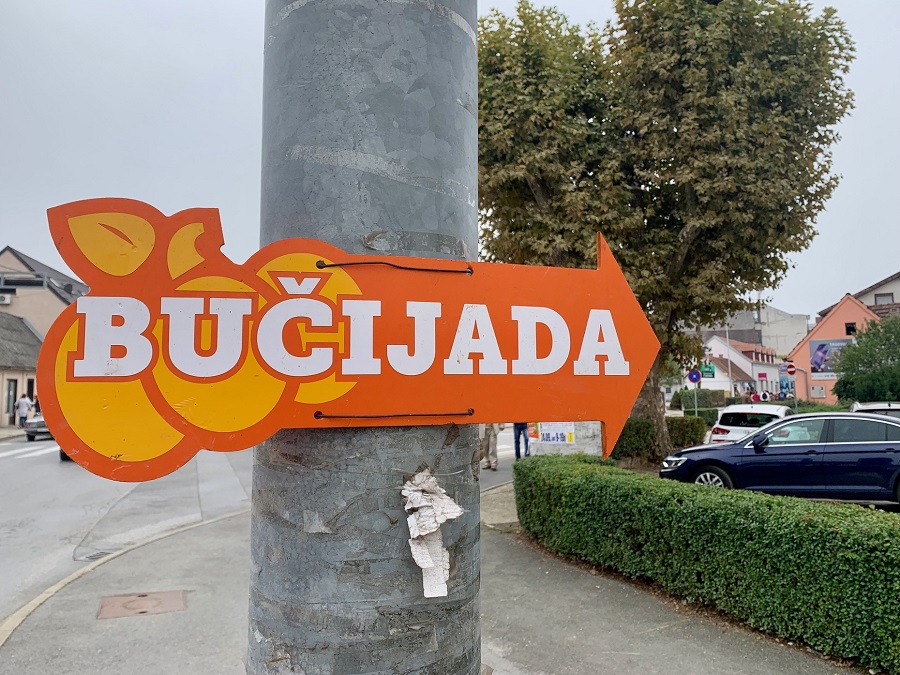
(The annual bučijada in Ivanić Grad, outside of Zagreb, is one of the town’s largest fall festivals.)
How fun would it be to sample Croatia’s versions of this fall favorite and pick up some new treats too?! What do they have here that’s different from what we have at home? As it turns out, quite a lot.
Consuming pumpkin
My stomach led as I walked off the train in Ivanić Grad the next morning. I met the wonderful Aleksandra, and asked where I could find pumpkin pie. “We don’t make that here,” she said. What about pumpkin bread, surely this bread-forward culture loads it into the bakeries? No again. Had I tasted bučnica? The savory pastry is a pumpkin strudel, popular in and around Zagreb, and made with pumpkin, fresh cheese, cream, and eggs wrapped in a thin dough. My first-ever serving there at the festival was pretty darn good.
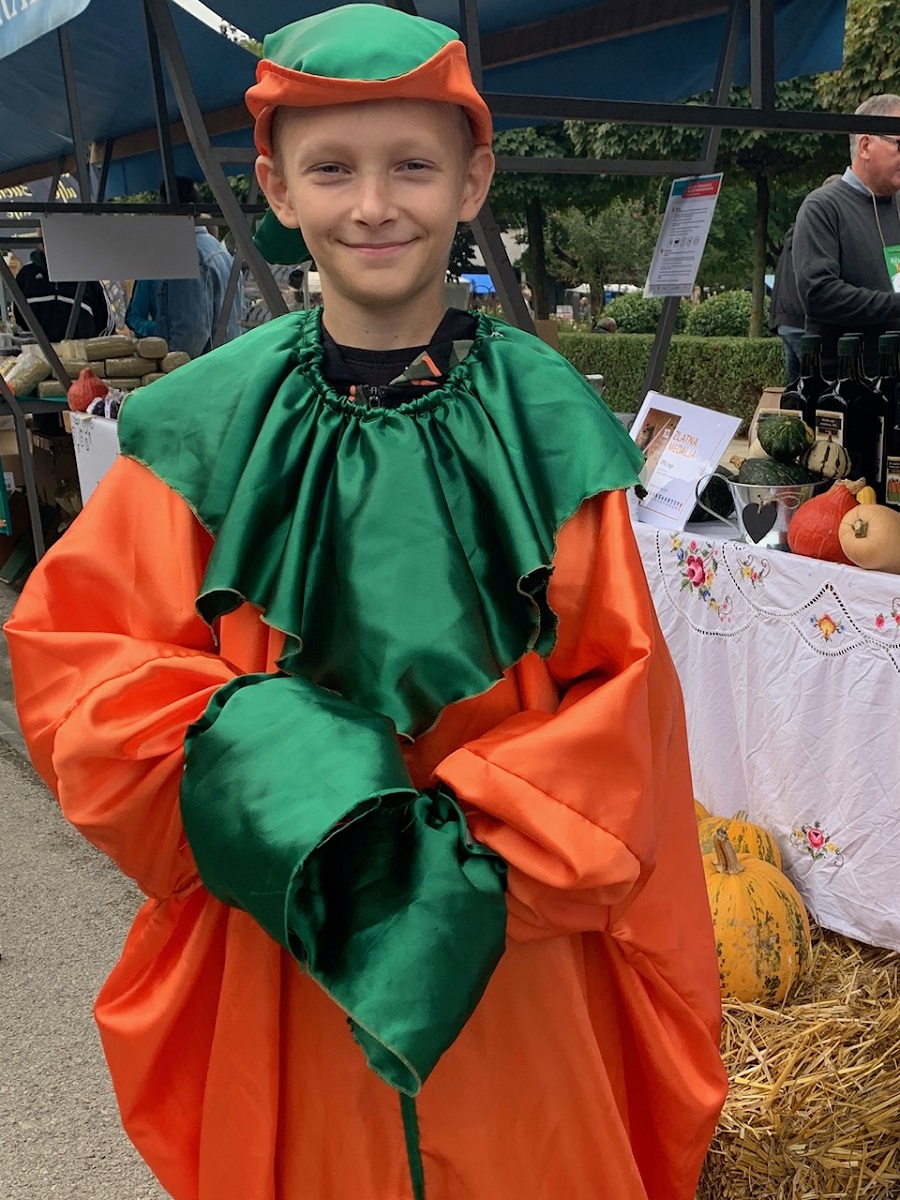
(The sweetest pumpkin at the festival was working the crowd near his family’s product table.)
Croatians love all sorts of fresh vegetables, why don’t they cook and eat more pumpkin? Because the squash is considered animal feed. So sad…
Fresh pumpkin seeds and pumpkin beer were abundant however, and pumpkin seed oil—bučino ulje—was the prize at the festival. An entire street was dedicated to OPG’s selling this nutty-tasting oil and other pumpkin products.
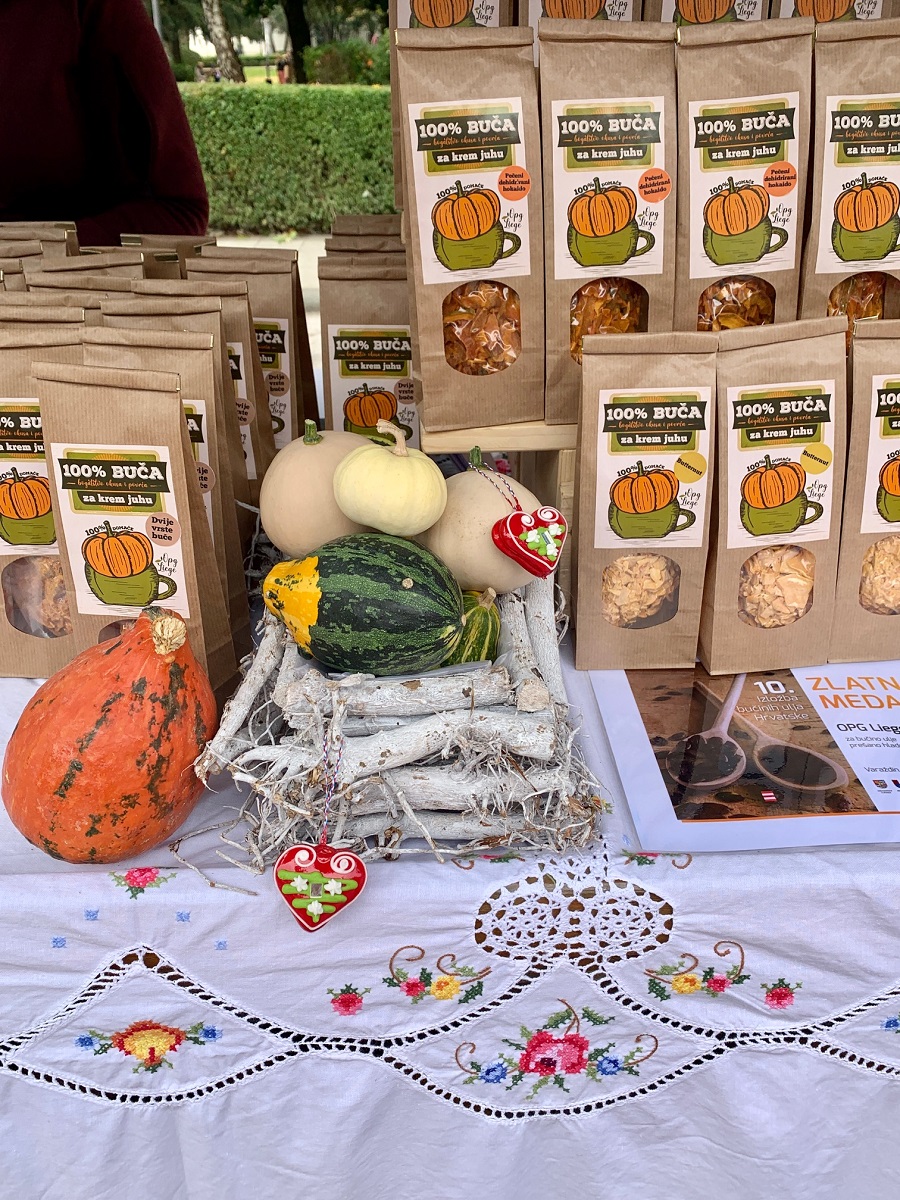
(A dried soup mix, made with 100% pumpkin, is a unique product.)
Pumpkin seed oil
Apparently, bučino ulje is a prestigious business, I noticed that several bottles displayed “winner” stickers. I knew why as soon as the oil hit my tongue—I was blown away by the flavor. I’ve had the store-bought oil and I will never do that again, there’s absolutely no comparison to Cro’s homemade product.
I was instructed on proper usage—don’t cook with the oil; only use it raw; cover food such as leafy greens and bean salad; drizzle it on strudel and vanilla ice cream; add to soups and stews for nutty sweetness. I’m pretty sure I’ll be sprinkling it on everything.
My disappointment over the pie was replaced with glee over the oil.
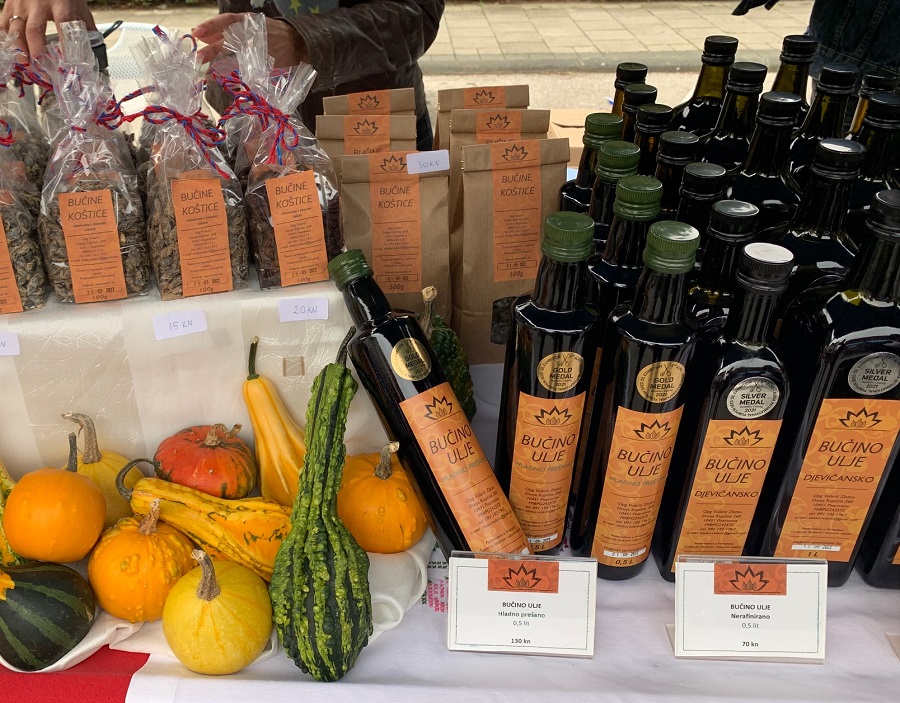
(Award-winning pumpkin oil, along with seeds coated in chocolate and other toppings, are frequently displayed on vendor tables.)
Eliminates wrinkles
Beyond trail mix and culinary applications, pumpkin seeds have serious medicinal credentials. They’re a rich source of vitamin E, zinc, omega 3- and 6- fatty acids, and antioxidants. In this regard, pumpkin seed oil is on par with Croatia’s other superfood—olive oil. It can improve heart health by lowering cholesterol and reducing high blood pressure. For us ladies, it’s an ingredient in skincare products that help hydrate the skin and eliminate the appearance of wrinkles. That right there is enough for me to gulp it.
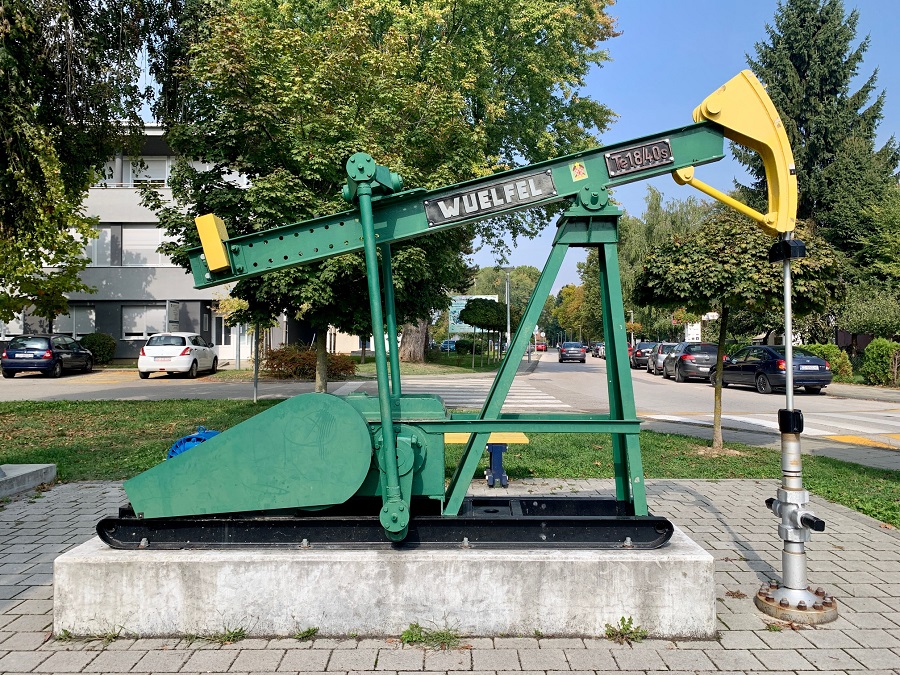
(Not far from the festival, INA’s oil drills can be seen around town.)
Black gold
I thought I’d seen what the town had to offer when things went in a different direction. Ana Gašparović, president of the Association of Heritage Friends and a local tour guide, educated me on Ivanić Grad’s “black gold.” It’s a designation given to the town’s three prominent native oils—pumpkin, petroleum, and Naftalan.
(The Naftalan Special Hospital for Medical Rehabilitation was built to treat skin disorders, specifically due to the discovery of Naftalan oil.)
Black oil began bubbling up from the ground in 1855, when it was pulled by hand. One hundred years later, after World War II, Germans led the first industrial production and oil drills can be seen around town. The headquarters of the oil and gas utility INA is located a few blocks from the festival, along with several other company buildings. Ivanić attracted the nickname “Little Kuwait” for its generous crude supply. Unfortunately, today it’s drying up and production will soon be shutting down.
Slightly further away is Naftalan Special Hospital for Medical Rehabilitation. The facility is dedicated to the treatment of inflammatory skin disorders, such as psoriasis, and features creams and bath oils made from the medical Naftalan oil. Ivanić discovered its natural resource of Naftalan in the 1980s, which is rare. Azerbaijan is the only other place on the planet where the oil is found.
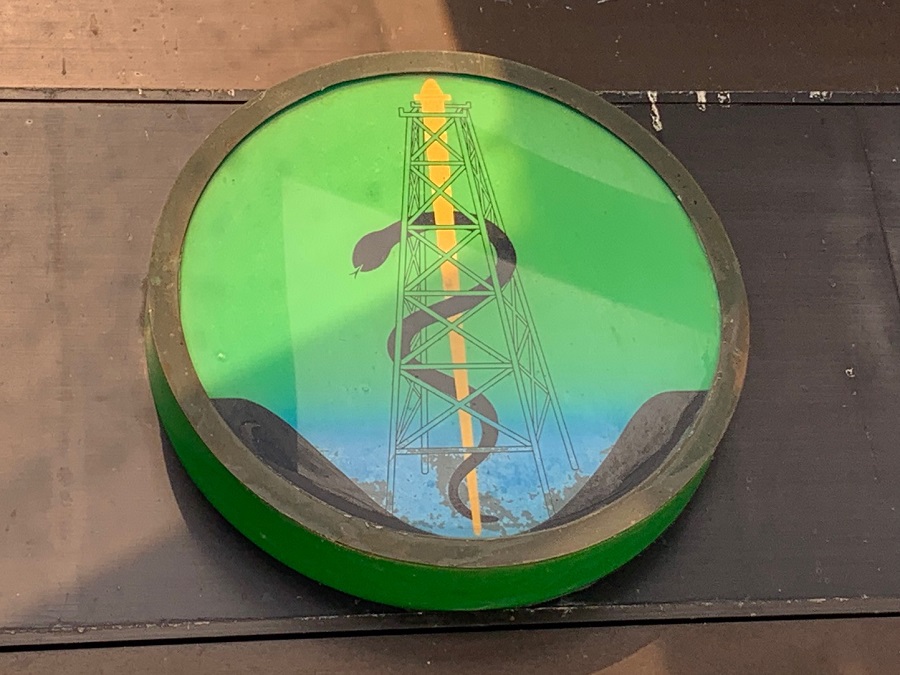
(The integration of the medical and crude industries is represented in a graphic above the entrance to the Naftalan hospital. A snake and staff, symbolizing medicine, is combined with an oil rig.)
Yellow gold
Aleksandra joked with me that Škrlet is Ivanić’s “yellow gold,” a grape varietal that’s indigenous to the Moslavina region. Eight vineyards produce wine from the slopes of the Moslavačka gora Mountain. Janko Kezele, president of Škrlet Moslavina Association and one of the eight family producers, said, “We are proud to produce the wine as we nurture our tradition and identity of our region and our homeland.” Doing my homework for this story, I found it light, fruity, and rather likeable.
(Several items made it home in the author’s backpack: two Škrlet wines (by Kezele and Mikša); 100% virgin pumpkin oil by Bachusha; dried soup mix by OPG Liege; black garlic by OPG Knežević.)
A rural festival
The festival was spread out with multiple locations of vendors, activities, displays, a music stage, and food concessions, and it was packed with visitors. Ivana Alilović, Director of the Zagreb County Tourist Board, said, “We’re happy to have 200+ rural exhibitors participate in this year’s festival, especially during these times with covid.” It’s Ivanić’s biggest pumpkin festival yet and it’s got a lot to offer.
On the train
Riding the train from Ivanić back to Zagreb, I reflected on how a pumpkin festival broadened my perspective. My American brain recalled memories of pie, warm apple cider, and picking pumpkins from a patch. My Croatian experience was a cultural enlightenment that included bučnica, bučino ulje, Škrlet, and a cool history lesson on the town’s industry, plus I met some nice local people.
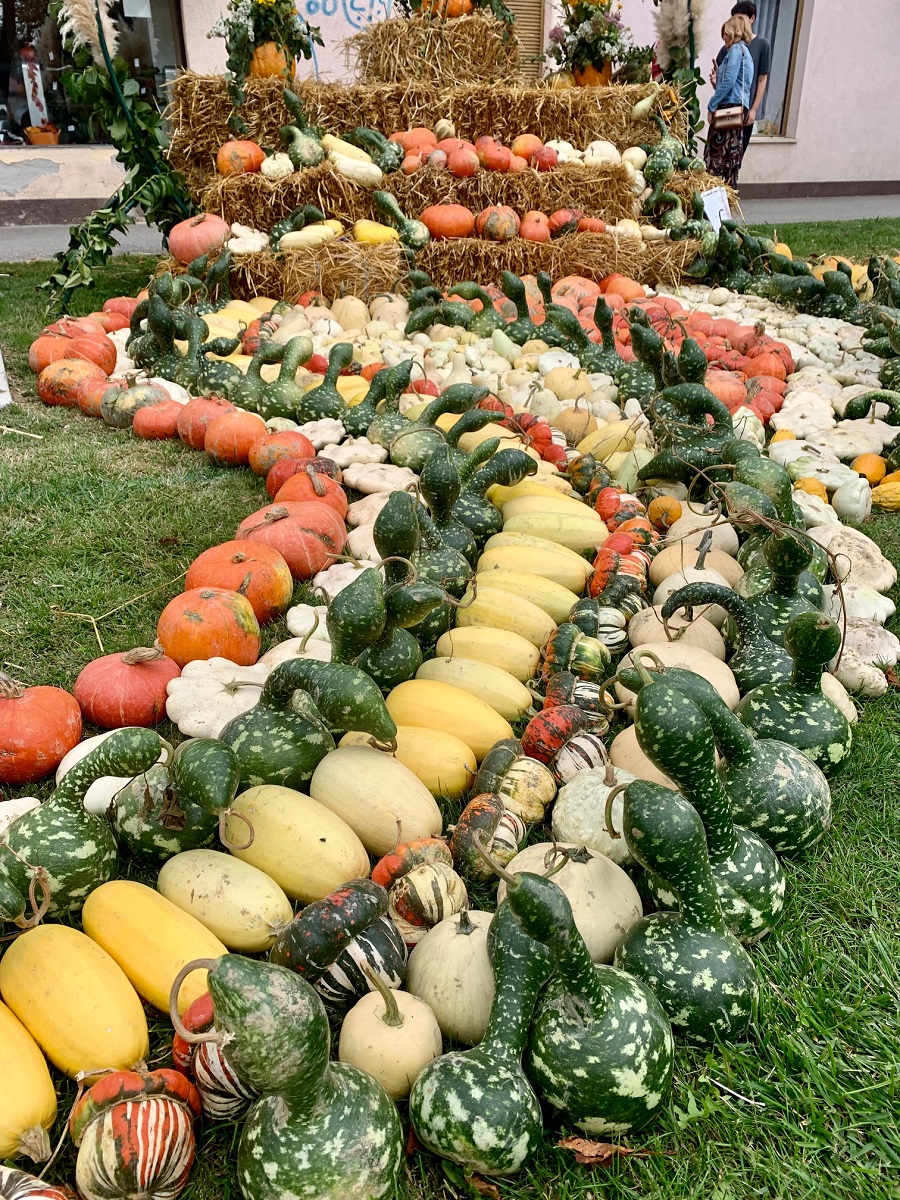
(It takes all shapes and sizes of gourds to make a colorful pumpkin patch.)
Story and photographs ©2021, Cyndie Burkhardt. https://photo-diaries.com
Learn more at TCN’s Digital Nomads channel.
The Storkman Movie: Origins of Famous Malena The Stork Online
October 4, 2021 - The Storkman Movie is a documentary about rescuing the famous Croatian stork called Malena, who sadly passed away earlier this year.
Croatian and international animal lovers were sad due to the tragic loss earlier in July of 2021when the beloved stork Malena (a Croatian word that can be roughly be translated as little one when talking to/about a female) passed away.
As many already know, Malena was the stork Guillette to Klepetan, a male stork who would always return to her in the Slavonian village of Brodski Varoš, located not too far from Slavonski Brod.
The love birds filled Croatian and global news outlets for nineteen years and it all started with Brodski Varoš resident Stjepan Vokić. He found Malena in 1993. Her wing had been shot through, and Vokić rescued her. Vokić's nurturing saved her life, but Malena couldn't fly anymore and, unlike many storks flying south every year, had to stay in the village forever. This makes Klepetan's return every year after the two first met in 2002 all the more interesting, showing animals have both love and loyalty humans could learn a lot from.
So much so, it inspired a documentary film produced in 2020 and titled ''The Storkman''.
''The story of a retired and widowed man from Slavonski Brod amazed many, kept our hearts warm and returned a feeling of hope that man and nature still have sympathy for each other and that the love between humans and animals can withstand even the biggest obstacles in their way,'' reads the movie description on Culturenet.
The director of the film is Tomislav Jelinčić, whom the Croatian audience know best as a journalist, editor, and TV host at RTL television.
The movie premiered in Croatian cinemas back in May 2021, but now you can also watch it online with English subtitles on Vimeo on demand.
Taking the focus away from solely being about Malena and Klepetan's love story, the film promises to reveal more about the nurturing of Malena herself.
Storks are beloved guests at Lonjsko Polje. Learn more on our TC page.
For more about animals in Croatia, follow TCN's dedicated page.
DUMP Internship: No More Excuses; Perfect Your Knowledge!
October 4, 2021 - The DUMP internship is a way for young developers in Split to acquire new knowledge and skills in programming, marketing, design, and multimedia.
The DUMP Association of Young Developers is looking for new members! The young digital group in Split is organizing another DUMP Internship. It is a free six-month program in which participants - trainees - have the opportunity to acquire new knowledge and skills in the field of programming, marketing, design, and multimedia.
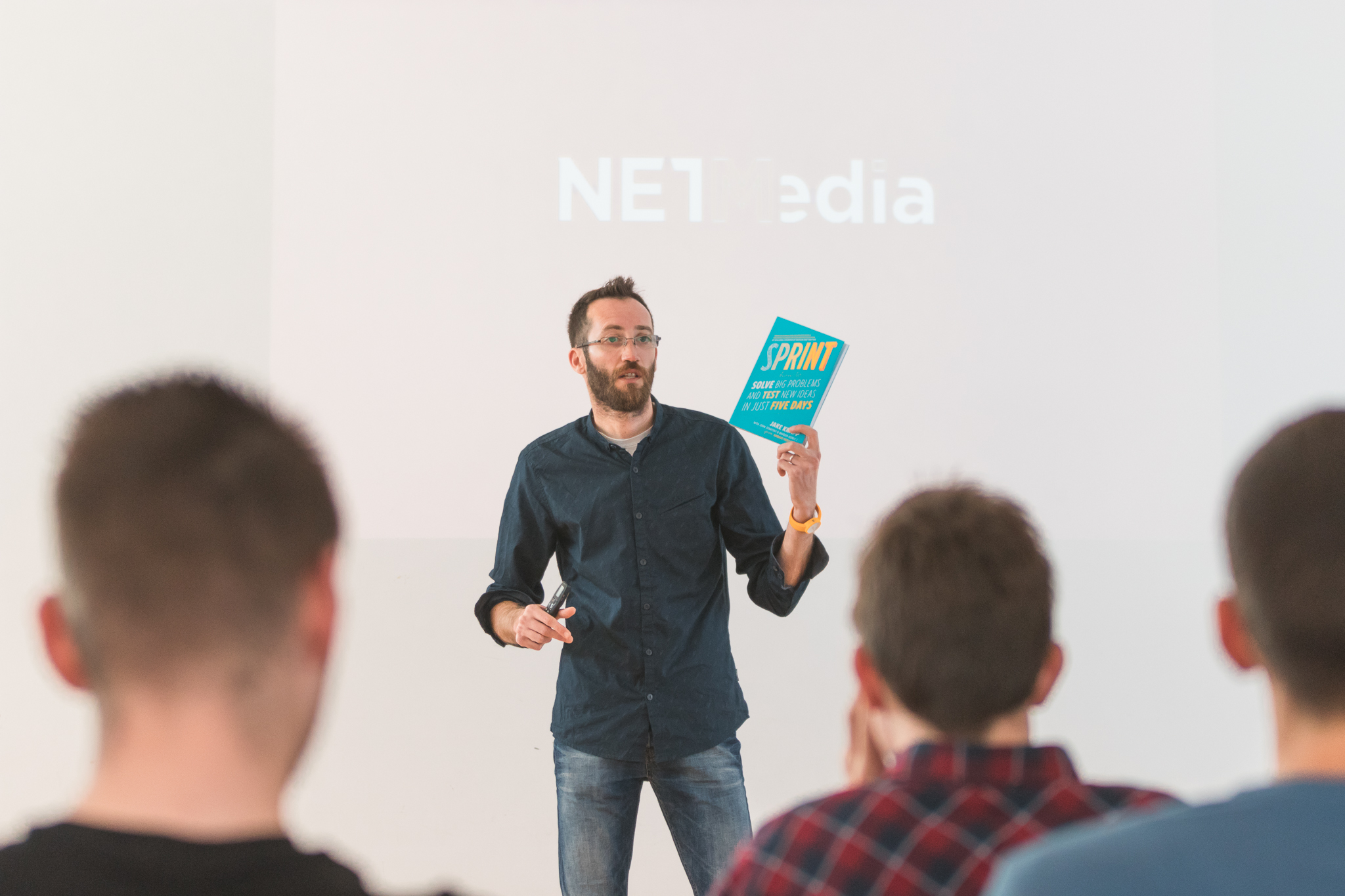
The DUMP Internship is intended for high school and college students who are fond of technology, learning, and challenges. The program's primary goal is to train future generations with the knowledge and experience needed to further work through various theoretical lectures, workshops, and real projects.

“The internship showed me everything I need to become a developer and how to better organize myself over time. In addition to knowledge, I gained new acquaintances and friends and learned the importance of communication in the business world. I am currently programming at DUMP and plan to get a job soon," said Frane Doljanin, head of the educational IT cycle.
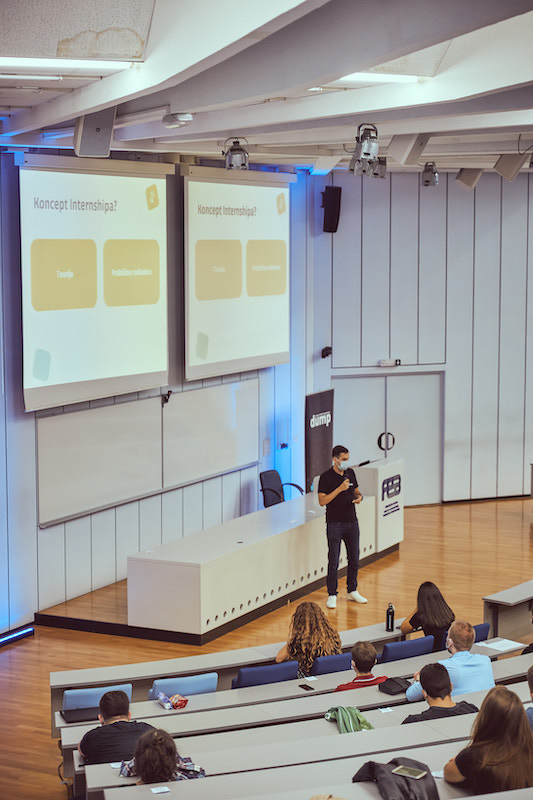
Many local and internationally recognized IT companies eagerly await DUMP interns who are taught by experts during lectures to teach trainees about the latest industrial practices and technologies.

In addition to knowledge and skills, the DUMP Internship also allows you to meet other ambitious people who share similar interests. Thus, the Internship is an opportunity to gain solid and long-standing friendships.
Applications are open until October 18, and all those interested can find out more about the DUMP Internship at: www.dump.hr/internship.
Author: Ian Paligorić, Photos: Josip Svalina
For more, make sure to check out our lifestyle section.
Suspended Referee Ivan Bebek Tells His Side of Hajduk Story
October 4, 2021 - Suspended referee Ivan Bebek tells his side of the story after an audio recording of him insulting Hajduk and a Split journalist.
"I have been doing my job conscientiously since day one. Football is my life, and I don’t want anyone to take it away from me for a private message. It was easier for me to bear it after the support that came, just people from Dalmatia. I can say that I was wrong, but what I said at no time was intended for the public," Bebek said.
"Mijaukanje (meowing) is a colloquial, benign term I often use. This was thought to be about the fans. A mark for objecting or seeking the reason for defeat in the referee's decision, whether correct or not. I apologize if anyone misunderstood this," Bebek added, noting that he wanted to explain how this came about:
"I get threats and insults every few days. I try not to let it affect me, but obviously, after the "kill Bebek" shouts it's not like that. I was also physically attacked. Let me have a moment with a friend in which I say something inappropriate. This is the hardest moment of my career. Something that encroaches on the sphere of trying to show me what I am not. When I read about myself, I wonder if it’s me. How can I defend myself against the thesis that the word “meow” is so ugly? At no point did I refer to Hajduk or Hajduk fans," Bebek said, adding that he considered his credibility as a referee not to be undermined by this.
"I have been feeling uncomfortable coming to Split for a long time," he admitted.
"It is not easy for the players, the presidents or the fans, and journalists have their tasks. I fully understand that and from this point of view when I am calm I can understand some things, but not all," concluded Bebek.
After the recording was published, the president of the HNS, Marijan Kustić, reported Bebek to the Disciplinary Commission, which decided to initiate disciplinary proceedings and suspended Bebek until a decision was made on a possible punishment.
After the 10th round HNL match between Hajduk and Lokomotiva, which was refereed at Poljud, Bebek insulted Hajduk fans and Split journalist Blaž Duplančić in a private conversation. This all stemmed from a controversial moment in the 9th minute of the match when there was contact between Livaja and De Haas, after which Bebek did not award a penalty kick for Hajduk nor did he consult VAR.
Hajduk immediately requested a statement from HNS, and HNS hastily opened an investigation, forwarding the entire case to the Disciplinary Commission for urgent resolution.
To follow the latest sports news in Croatia, follow TCN's dedicated page.
To learn more about sport in Croatia, CLICK HERE.


